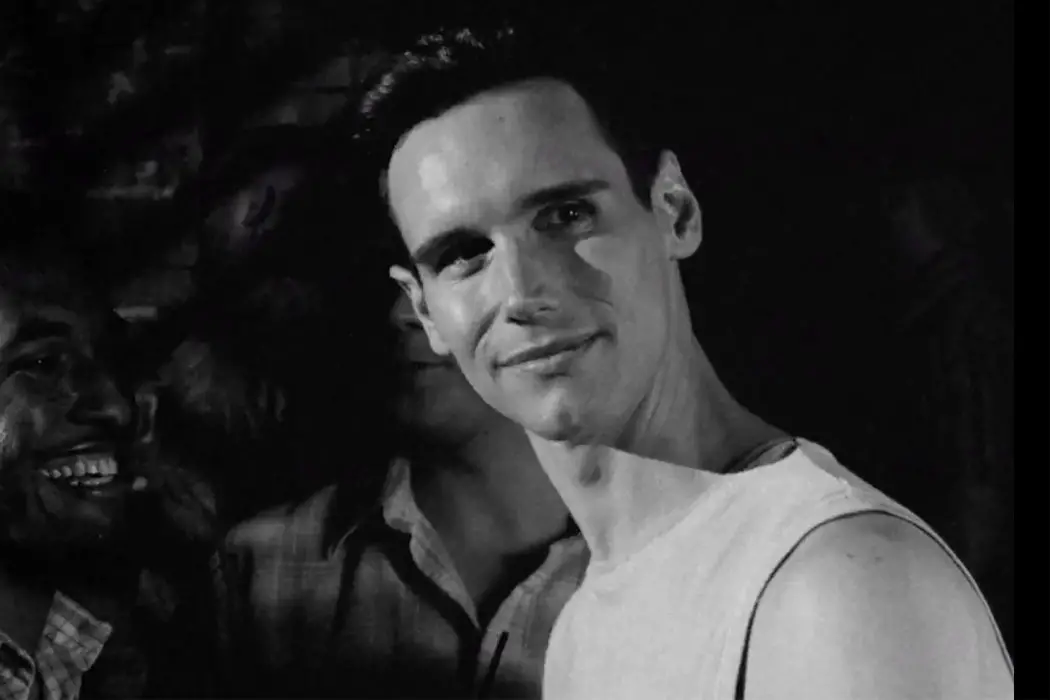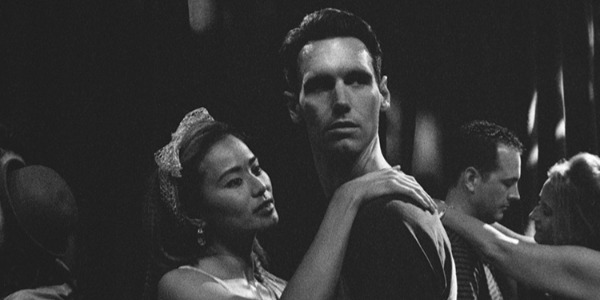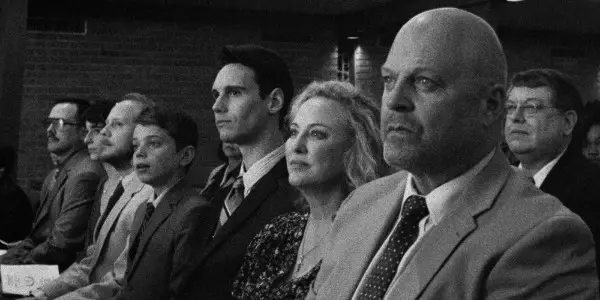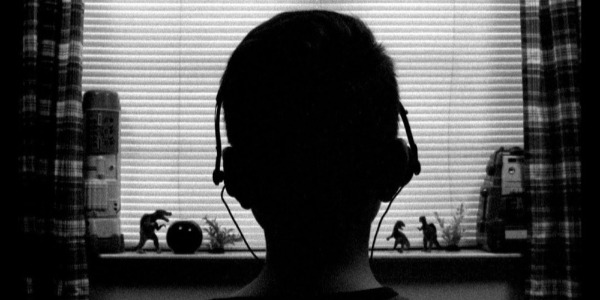Melbourne Queer Film Festival 2019: Interview With Cory Michael Smith, Star Of 1985

Alex is a 28 year-old West Australian who has a…
It seems like the AIDS epidemic has only been mined for two emotions when handled by Hollywood; heartbreaking tragedies by most, charmless punchlines by others (especially when looking back at Team America through modern lenses). With such a history of daunting dramas, it’s refreshing to watch Yen Tan‘s 1985 change this formula, a nostalgic time capsule that captures a very specific time and place – focusing on one of the many tragic cases that emerged during the dark decade – focused on cutting character interactions rather than any “misery porn” melodramatics, a blunt term that could be accurately applied to too many AIDs-related festival films.
Captured by Hutch’s grainy but gorgeous black and white 16MM film cinematography, actor Cory Michael Smith effortlessly carries 1985 upon his sturdy shoulders, guiding the audience through a series of unrelentingly raw and somber conversations that slowly peel away at the layers of the archetypal family unit of the time, as well as Smith’s own emotionally guarded mindset. Alongside his memorable appearances in Todd Haynes’ Carol and the HBO mini-series Olive Kitteridge, Smith is most well-known for his role as Edward Nygma in the television series Gotham, which is (literal) worlds away from his work in 1985, a terrific demonstration of his talents as a leading man; a potential we hope to see fulfilled in the near-future.
In 1985, Smith takes the lead role as Adrian, a lawyer burdened with a painful secret that he struggles to deliver to his conservative parents (Michael Chiklis and Virginia Madsen) when he returns home for Christmas during the titular year. Reconnecting with the places and people that he abandoned when he promptly moved to New York during his teenage years, Adrian slowly comes to terms with his new reality, a scary but ultimately hopeful future that he slowly discloses to his family and friends.
I had the chance to talk with Cory Michael Smith about his new film, working with the director Yen Tan, the theatrical nature of the shoot and allowing his Gotham co-star Michael Chiklis to play a different kind of father figure.
Alex Lines for Film Inquiry: I watched the film last week and you gave a really terrific performance in 1985, so to start off with, I wanted to ask how you initially got involved with this project?
Cory Michael Smith: I was given the script and initially they were planning to shoot it during a period of time when I wasn’t available as I was shooting Gotham, but I really enjoyed it. I read the script knowing that I would never be able to do it. The script came back to me five months later, as the dates had been pushed, so I decided to read it again, knowing that they were going to shoot it during my hiatus.
The second time, it just really demolished me and I really wanted to talk to the director, so we Skyped for like an hour and we just had a very symbiotic idea of the story, the family and his look, he was very instructive and I really enjoyed what he was picturing stylistically. We just really hit it off and he offered me the job the next day.
Had you seen the original short film that 1985 was based on, or any of Yen Tan’s previous work?
Cory Michael Smith: Yes, I had seen the short film, so I understood what they were going for. The story is very different, but stylistically in the way it’s shot and the tempo of it, I could glean when he was going for, for sure. I was familiar with some of his work, but not all of it.

How do you prepare yourself for a role like this?
Cory Michael Smith: Well, every job is different in regards to what it requires to develop a performance. With this script, my emotional reaction was so intense immediately when I read it, that I didn’t need to come at the work and construct an emotional life, it was very raw to begin with. A lot of my work was just taking care of that and making sure that the character was preserved and not ruin it by jumping into text and making things studied. For me it was more of taking this emotional nugget that I had and building around it.
I spent time talking to some doctors in New York City that were working during the 80’s, who were on the front lines at the beginning of the epidemic. I also talked to some people who lost friends and loved ones, to see what the experience was sort of like, and listening to their stories of seeing a loved one waste away and become decimated. I also looked at quite a few pictures from the end of their life on a hospital bed. That’s how I spend most of my time and then I did the script work I needed to do to memorise stuff.
Did you find yourself drawn to Yen Tan’s preference of long takes and nonverbal communication?
Cory Michael Smith: Oh my God, yes. In a lot of ways, in a lot of the scenes, it felt like theatre. When shooting, you can get used to the fact that something’s going to be edited and it’s not that you get lazy as a TV or film actor, but there’s a calm that you can have knowing that you can really go for things and you know, make big choices knowing that it might or might not be used.
This time though, it was like, well no, we’re working on film and it was a small budget so we couldn’t do a ton of takes. We had a finite amount of film to work with, so it required a level of preparation and understanding of exactly how each scene would play out, which brought a real happiness in being able to use my skill set from theatre on a film set.
Yeah, especially because when I talked to Yen last week, he was talking about how these long takes, especially in your final conversation with Jamie or Michael Chiklis, you find yourself leaning forward into the film because the camera just refuses to cut.
Cory Michael Smith: Yeah, It was nice to work with him, he was very trusting. We didn’t have a lot of time for rehearsal, so everyone showed up and did their best, the cast was very impressive in that way.
One of the credits I noticed was your executive producer credit, what did that role involve?
Cory Michael Smith: The title was given to me because I helped with some of the casting and helped bring in some money to get the film made. It was the first time where I was leading a film, so I was able to play a significant leadership role onset.
The only producer that was really onset was Hutch, who was doing the cinematography. Without getting into any details, there was also some troubleshooting as well I had to deal with, which is all I can say.

You work alongside Michael Chiklis on Gotham, did you bring him onto this film?
Cory Michael Smith: Yeah. I brought Chiklis on; we have trouble casting the Dad, because when you read the script, there’s a very specific language and if you’re not familiar with Yen’s work and what he’s going for, it’s very easy to read the script and think it feels thin or that there aren’t really great performances on the page. I called Chiklis and said, “Hey man, boy do I have a way for you to lose money”.
I said, you’re not gonna make any money making this, but you’d be working with me and a great filmmaker, and it’s just a wonderful role. I also told him that there was going to be one giant scene that’s gonna make you want to do the film and that when you read it, just understand that most of this story is not written on the page and at the end there’s a very redeeming moment for the father. I said, that’s all I’ll tell you, just read it. That was on a Saturday and by Tuesday he was signed on.
His role felt very similar to the recent father figure characters in Call Me By Your Name or Boy Erased – these men who have to grapple with their son’s sexuality essentially.
Cory Michael Smith: Well, the father figure in Call Me By Your Name is very emotionally intelligent, and the reason that I thought Chiklis was such a great idea for this role is that he’s actually extremely gregarious and he’s an amazing husband and father. He’s a very loving and intelligent guy, and he’s not afraid to be emotional, to talk so lovingly about his daughters.
I was like, what if you just completely shroud all of those qualities, what if you were this loving father who was incapable of that for whatever reason, because of either conditioning, cultural influences or being in the military, someone who is completely incapacitated; who is this father that just doesn’t know how to reach out but has all of those feelings? I thought that was interesting character.
I think there’s a certain level of contextual baggage that audiences will bring with them when they see Chiklis because he’s such an established actor with TV shows like The Shield and Gotham, so it’s nice to have those expectations subverted by the end of the film.
Cory Michael Smith: Yeah, I think he was very hungry to do something different than he normally does. He goes from being an aggressive cop on Gotham to being a submissive player in the family here, even though his silence is quite overwhelming sometimes.
You touched upon it before, but because it was a low budget film, I assume that you pretty much had no time for rehearsal, but you share such a natural chemistry with each of the individual members of your family that you interact with, was this something that developed naturally onset?
Cory Michael Smith: Yeah, I think we just got quite lucky. We got along, everyone showed up and was ready to work, and we all quite clicked. We all wanted to be in the film and tell this story, which I think helped as well. But yeah, There was really no time and actually the first day we shot was me sobbing under the bridge.
Oh wow, that must be intense.
Cory Michael Smith: Yeah, we showed up on day one and I’m meeting everyone on set, Yen is high anxiety, and I’m like, just tell me when to start because all I need is it for it to be quiet and I’ll be good. They gave me just a little warning once they were all set up and then we did the damn thing.
I think it was a nice start because we knocked that out on day one, so by day two, when we were shooting some family scenes, everyone else just showed up ready to work. They were all incredibly professional and capable actors, which is a very satisfying thing. It’s not something you always get.
I gather that the pressure of shooting on film also added a dramatic tension because every moment matters. You can’t really make any flubs or mess up a take.
Cory Michael Smith: Yes, I kinda like it. Working on Gotham for the past three years, you have to show up and be ready to go because you really only get a few takes and then you gotta move on. I was very comfortable with that pressure and for other people, they’re all showing up understanding that you don’t get a lot of takes, which just means that everyone does their work.
There are some directors that like to do many, many, many great takes, (there’s justification for that sometimes, especially with certain actors), but it’s kind of amazing sometimes, when you’re working with people that are very capable and have really done the work and show up, sometimes the first take of something can be just absolutely stunning and magical. And a lot of times I think Yen used the first take of stuff.

Speaking to that, one of the major emotional backbones of the film is your relationship with your mother, who is played by Virginia Madsen, how was she to work with?
Cory Michael Smith: Well, I think it was day four when we did the final scene between the two of us where she’s dropping me off at the airport. We sat in the car and Yen left us alone, he had the camera on roll and told us to start when we wanted to. It was just easy, she’s such an incredible actress and this performance in particular I think is one of her best. She’s stunning in it and to work with her and look at her face and to see the way that she looked at me, made me emotional.
I felt very, very connected to her, It was very nice. She’s like a wild spirit, she’s very free and she speaks her mind, which is nice – You always know where she stands. I just felt really comfortable working with her, she was really gracious to me. The first day that I had met her, she just gave me a big ole hug, which just made me feel really comfortable with her.
I noticed in the script that your character never once says the words “Gay, HIV or AIDS”.
Cory Michael Smith: Oh yeah. It was indicative of the era and also the sort of the fear that the character had which was absolutely paralysing. You know, to actually say the words is really tough. It’s really brutal.
What was the biggest lesson you learned from your work on 1985?
Cory Michael Smith: It’s a great relief to have led a film for the first time that wasn’t a piece of trash, you know what I mean? In terms of the more practical or work side of things, figuring out how to preserve and foster – that is accessible on the day – can sometimes be a tough thing. I’m an actor that doesn’t really do that, some people do, but I usually completely rely on the text being my impetus for everything and the actual given circumstance and putting myself there.
It was nice to have to emphasise that in such a significant way through an entire film. To know that I could do that and that there’s a way to do that, helped me learn a lot more about my personal craft. It was very helpful to me and gave me a lot more confidence moving forward.
Film Inquiry thanks Cory Michael Smith for taking the time to talk with us.
1985 is currently available to rent/buy on Digital in the US, and will playing this March in Australia at the 2019 Melbourne Queer Film Festival, details for sessions can be found here.
1985 will also be released theatrically in Australia through Icon Productions on 25 April.
Does content like this matter to you?
Become a Member and support film journalism. Unlock access to all of Film Inquiry`s great articles. Join a community of like-minded readers who are passionate about cinema - get access to our private members Network, give back to independent filmmakers, and more.













